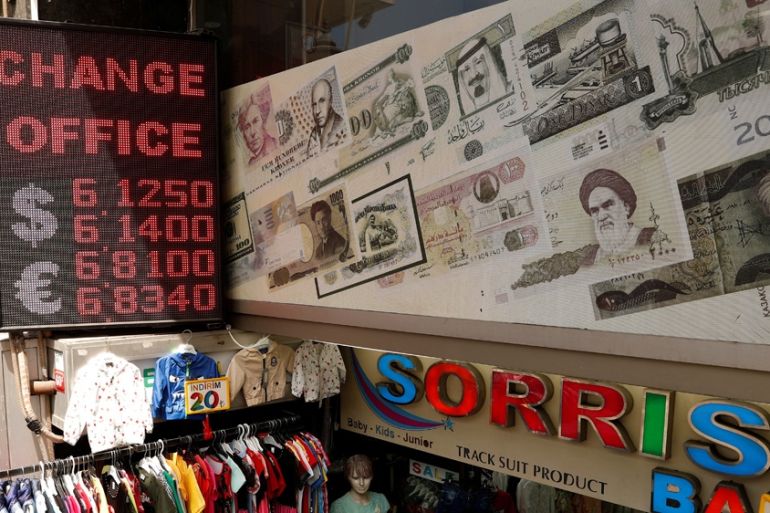Turkey’s central bank slashes rates as sanctions threat fades
Move marks the third consecutive interest rate cut since July that is designed to boost Turkey’s recession-hit economy.

Turkey‘s central bank cut its benchmark interest rate by more than expected on Thursday, following Washington’s announcement on Wednesday that it is cancelling sanctions over Ankara’s military action in Syria.
Citing “continuing improvement” in economic activity and a better inflation outlook, the central bank’s monetary policy committee cut the benchmark one-week repo rate from 16.5 percent to 14 percent.
Keep reading
list of 3 itemsUsed to economic pain, some Turks shrug off US sanctions threat
Trump lifts US sanctions on Turkey, says ceasefire permanent
This is the third consecutive interest rate cut since July that is designed to boost Turkey’s recession-hit economy. Lower borrowing costs enable businesses and consumers to spend more, which fuels growth.
Some economists were surprised by the aggressiveness of the cut after two weeks of lira volatility related to Turkey’s military campaign against Kurdish-led forces in northeastern Syria, which drew international condemnation.
But monetary policymakers said inflation would likely decline more than the central bank had expected by year end after a “significant fall” in September, and repeated guidance that the policy stance was “to a large part” consistent with that path.
Expectations for monetary easing were initially curtailed after troops crossed the Syrian border on October 9, hitting the currency and prompting United States sanctions over Turkey’s attacks on Kurdish forces that were once US allies.
But the lira, which plunged 30 percent last year, regained some losses after Washington opted last week for a light set of sanctions, reopening the door to the rate cut.
The Turkish currency rallied again on Wednesday when US President Donald Trump cancelled sanctions and said a ceasefire had been reached.
“They were definitely encouraged by the lifting of sanctions,” Piotr Matys, EM FX strategist at Rabobank, said of Turkish central bankers.
“It was a positive move and it increased the room for manoeuvre, but not enough to justify a cut of 250 basis points.”
The Turkish lira slipped 0.7 percent against the dollar, to 5.7750, after the bank’s third rate cut in as many policy meetings, totaling 10 percentage points of easing.
Last year’s currency crisis tipped the Middle East’s largest economy into recession, sent inflation soaring above 25 percent, and prompted Turkey’s central bank to hike rates.
Inflation has since eased, reaching 9.26 percent in September. In its latest forecast, the central bank expected inflation to accelerate to 13.9 percent by year end. But on Thursday the bank said “recent forecast revisions suggest that inflation is likely to materialize notably below the projections” by year end.
Syria effect
The stimulus comes as Turkey takes other steps to strengthen its economy including preparing a 2020 budget that an official said was “flexible” and could be expanded for the military.
Reuters news agency reported the Turkish treasury is also crafting legislation to transfer into the budget $17bn from a central bank fund.
To limit the lira’s fall this month, Turkish state banks have sold billions of dollars and trimmed funding in an offshore swap market, according to traders.
The rate cut is also meant in part to strengthen the economy given the military effort, “but I am not sure it will work,” said Selva Demiralp, director of the Koc University-TUSIAD Economic Research Forum, in Istanbul.
“Deposit rates and loan rates already declined as low as they can go given the inflation rate,” she said. “I think they would defend the economy better if they didn’t touch the policy rate.”
On Wednesday, Trump rolled back sanctions applied a week earlier on some top Turkish officials and ministries.
Yet many US lawmakers want a tougher response including one bill that would impose “crippling” sanctions on Ankara. Separately, US prosecutors last week charged Turkey’s Halkbank in a move the state bank said was tied to Syria-related sanctions.
The military incursion could also draw sanctions from the European Union.